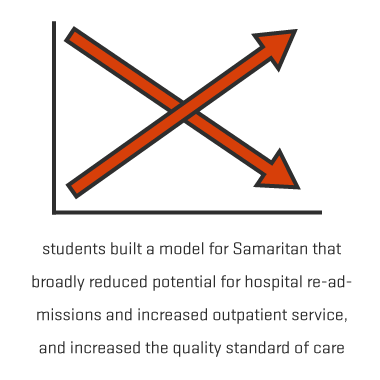News, articles, and interesting stuff from the College of Business

MBA, Business Analytics
After earning a bachelor’s degree in economics from Oregon State in 2014, Shadi Taha wanted to pursue a specialized MBA that would help him stand out. Applying statistics to economic models, a field called econometrics, captured his interest, and he was fascinated by big data. So Taha chose Oregon State’s Business Analytics MBA program.
“Business analytics is the most marketable skill set you can have,” Taha said. “Analytics is about leveraging and understanding data to make better business decisions.”
Taha, who earned his MBA last June, landed an internship with Daimler Trucks-North America in Portland. He’s been hired by Daimler and will start a new job as a data scientist when his internship is complete in December.
“I would not have the job I have now without the MBA,” Taha said.
Oregon State’s Business Analytics track is offered in an online/in-person hybrid format. The program emphasizes three skills: understanding business strategy and process, data management and analysis, and solution development and communication, said Director Bin Zhu.
“Analytics is about solving business problems,” Zhu said.
The program applies to any industry sector, and students are encouraged to bring their work-related projects. Because people are often part of teams at work, Business Analytics students also work on projects together.

For example, the Business Analytics students partnered with Samaritan Health Services to work on a real health care problem. The Samaritan project examined lab test results and health history data for cardiology patients and found a model to predict who would be most likely to have complications requiring hospital re-admission. By identifying these patients before heart surgery, Samaritan is able to focus additional care and avoid costly interventions in addition to improved patient outcomes.
Perren Baker, a 2015 program graduate, worked on the Samaritan project.
“One thing that amazed me was that a few MBA students could take a real-world business issue, apply what we learned in class and develop a good solution that that had both financial benefit and better patient care outcomes,” Baker said.
Since completing the program, he landed a job with Nike. Baker is a manager in the procurement department, where he uses data analytics to increase efficiencies, decrease waste and reduce the cost of materials used to make shoes. He said Oregon State’s professors taught him how to gather and analyze technical data, while never losing sight of the importance of turning that information into impactful business decisions.
“It was a great way to learn,” Baker said. “The analytics track set me up for success in going back out in the workforce.”